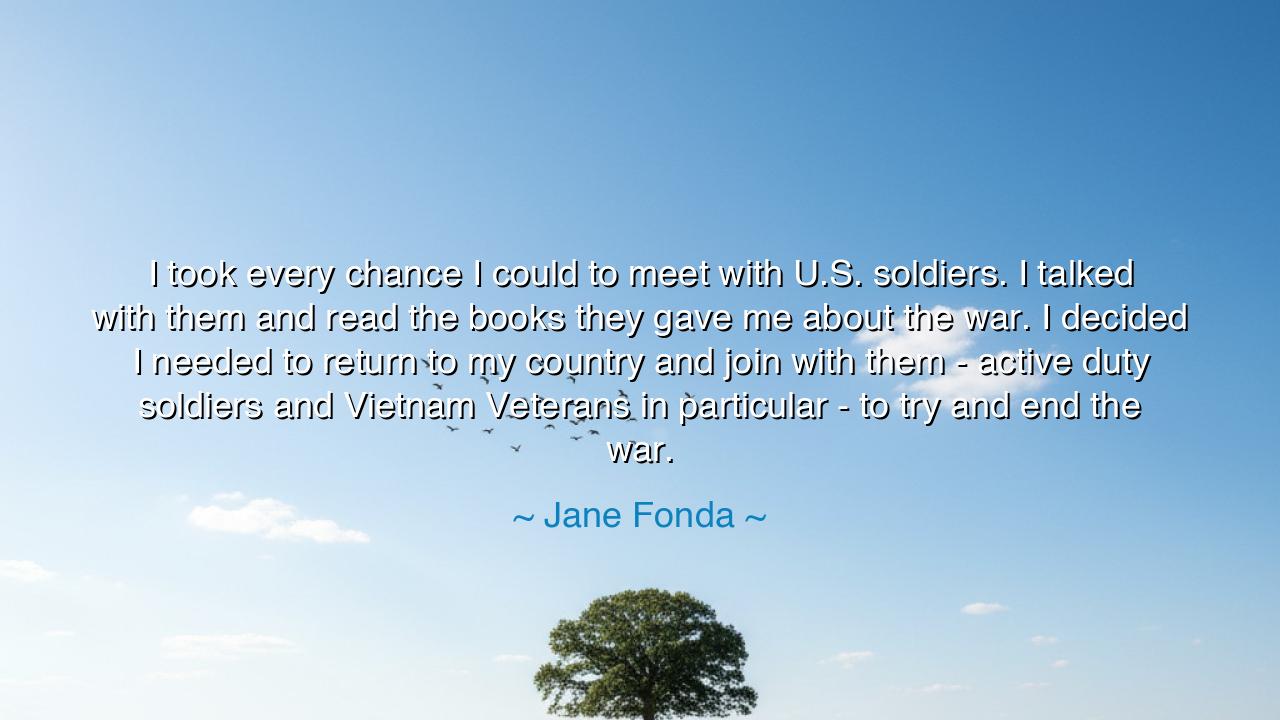
I took every chance I could to meet with U.S. soldiers. I talked
I took every chance I could to meet with U.S. soldiers. I talked with them and read the books they gave me about the war. I decided I needed to return to my country and join with them - active duty soldiers and Vietnam Veterans in particular - to try and end the war.






In the annals of history, there are moments when individuals, driven by a sense of duty and moral conviction, choose to stand against the tide of injustice, even when it means confronting the very systems that have shaped their world. The words of Jane Fonda, an actress and activist who became a symbol of protest during the Vietnam War, resonate deeply with the call of the ancients: "I took every chance I could to meet with U.S. soldiers. I talked with them and read the books they gave me about the war. I decided I needed to return to my country and join with them - active duty soldiers and Vietnam Veterans in particular - to try and end the war." These words reveal the heart of a woman who, recognizing the weight of her country's choices, sought not only to understand the war, but to become a part of the movement that would end it.
The ancient world often saw such acts of conscience as the highest form of virtue—when an individual, regardless of their station, chose to act in the service of truth and justice. The story of Socrates, who stood alone in his quest for the soul of Athens, is one such example. Socrates’ willingness to challenge the very institutions of his society, even at the risk of his life, reflects the same spirit of resistance and moral clarity that Fonda embraced. Just as Socrates confronted the status quo to seek truth, Fonda confronted the war, knowing that her actions could alienate her from many, yet certain that the cause was greater than herself.
Consider the Greek heroes, such as Themistocles, who, though often faced with overwhelming odds, chose to act out of a sense of duty to his people. Themistocles, knowing the might of the Persian empire, did not sit idly by. Instead, he rallied the Greeks, leading them to victory in the Battle of Salamis, forever altering the course of history. Fonda, like Themistocles, chose to confront the forces of war and violence, not with the weapons of destruction, but with the weapons of understanding and dialogue. She understood that to end the war, she must first understand the suffering it caused, not just from her perspective, but from the perspective of those most affected—the soldiers.
Fonda's journey was not one of simple protest, but a personal awakening. She chose to engage with those whose lives were entangled in the war—not from a place of judgment, but from a place of deep empathy. Her willingness to read the books soldiers gave her, to listen to their stories, and to truly connect with those on both sides of the conflict, reveals the wisdom of the ancients, who knew that true understanding requires stepping beyond one's own biases and truly immersing oneself in the experiences of others. In doing so, Fonda sought to bridge the divide, to see the war not just through her own eyes, but through the eyes of the very men and women who were fighting it.
This act of empathy and engagement calls to mind the philosophers of the Renaissance, who, in their quest for truth and knowledge, actively engaged with all aspects of society, including the poor, the oppressed, and those most affected by war. Leonardo da Vinci, for example, whose artistry and intellect transcended mere fame, often sought to understand the plight of those less fortunate and used his influence to bring about change in his time. Like Fonda, da Vinci understood that transformation in society comes not from isolation, but from engagement with those who are most directly impacted by the events around them.
In Fonda’s words, we find a powerful call to action—one that urges us not to remain passive, but to engage with the issues that shape the world around us. She teaches us that it is not enough to sit on the sidelines, distant from the pain of others. To truly understand the depth of a conflict, a situation, or an injustice, we must be willing to listen, to speak to those directly affected, and to join with them in their struggles. This lesson is as old as the ancient wisdom that tells us action in the service of justice is not only a matter of conviction, but of solidarity.
So, let us take Jane Fonda's example to heart. Let us engage not just with the world as we see it, but with the world as it truly exists. When confronted with injustice, let us not turn away, but reach out, listen, and understand. Let us seek truth not in the echo chambers of our own beliefs, but in the diverse and often painful realities of those most affected. Just as Socrates sought wisdom by engaging with all manner of people, and as Fonda sought understanding by listening to the soldiers she met, let us commit to being active participants in the world’s greatest struggles—not as distant observers, but as engaged agents of change. In this, we will find not just the wisdom of the ancients, but the power to shape a better, more just world.






AAdministratorAdministrator
Welcome, honored guests. Please leave a comment, we will respond soon